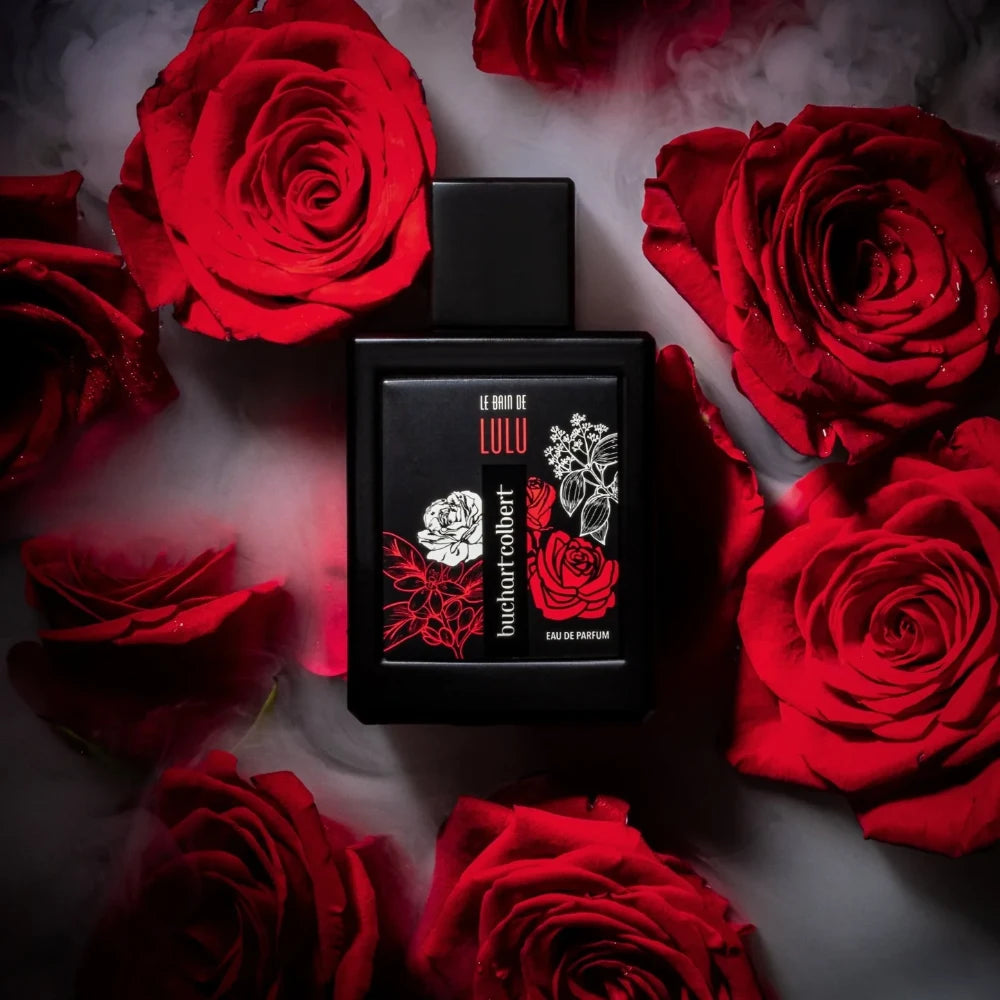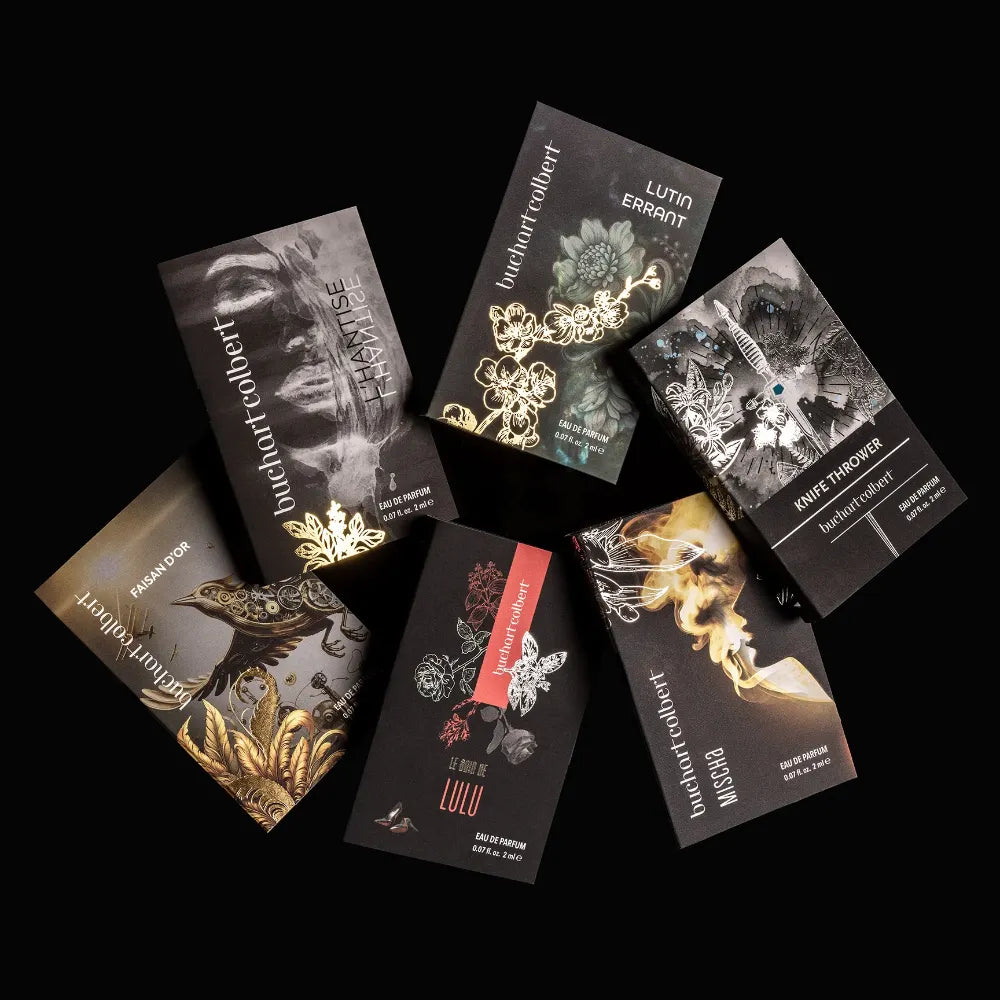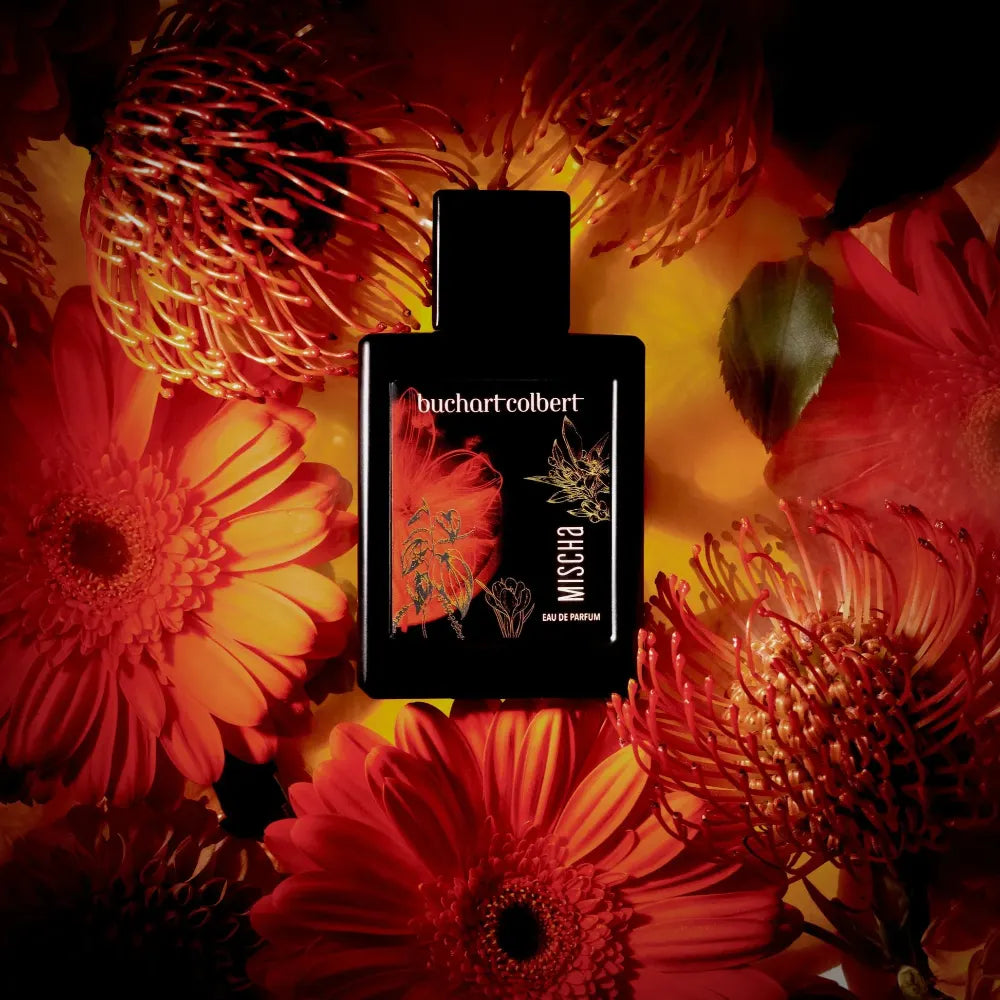What Does Mandarin Orange Smell Like?
Ever catch a whiff of someone peeling a mandarin orange and instantly feel happier?
That moment, bright, juicy, and fleeting, can transform an ordinary day.
The scent of mandarin orange is uplifting and nostalgic, yet hard to pin down.
Is it sweet or tangy? Light or rich?
Sometimes, we struggle to describe it, too, especially when it appears in perfumes, carefully balanced and subtly layered.
But mandarin orange is a bit different from bergamot or another citrus note. It’s cheerful, refreshing, and deeply versatile, capable of evoking sunlit mornings or cozy evenings depending on how it's used.
What is Mandarin Orange?
Mandarin Orange refers to the citrus fruit from the Citrus reticulata species, known for its thin skin, easy peel, and sweet, slightly tangy aroma. In scent compositions, mandarin is used to bring a fresh, uplifting quality that introduces brightness and warmth at the top of a fragrance structure.
Unlike bitter orange or lemon, mandarin has a more mellow and rounded profile. It adds an inviting freshness without being overly sharp or sour. This makes it ideal for fragrances that aim to feel clean, elegant, and approachable right from the start.
Mandarin is typically categorized as a top note, meaning it is among the first aromas noticed and one of the first before drydown to the last notes.
However, when combined thoughtfully, it can create a lasting impression, transitioning smoothly into heart and base notes.
Its adaptability also allows it to appear in both citrus-focused and more complex scent profiles, including gourmand, floral, and woody blends.
Mandarin Orange Fragrance Family and Scent Profile
What Does Mandarin Smell Like?
Mandarin has a fresh, juicy aroma that is distinctly sweet and slightly tangy. It smells like the fruit itself, vivid and full-bodied, but without overwhelming the senses. Depending on the variety used, it can also lean toward floral, green, or even slightly spicy nuances.
This citrus note delivers a sense of optimism and brightness. It is often described as clean and uplifting, with a soft sweetness that lingers briefly before giving way to heart and base notes. Its natural charm makes it suitable for daytime compositions, warm-weather wear, or any blend aiming to feel inviting and expressive.
Mandarin in the Citrus Fragrance Family
Mandarin belongs to the citrus fragrance family, known for its bright, zesty, and refreshing qualities.
It thrives across a variety of olfactive genres:
- Citrus Fresh: Pure, sparkling, and energetic. These scents highlight mandarin’s natural brightness.
- Floral Citrus: Feminine and elegant, blending mandarin with blossoms for airy romance.
- Amber Citrus: Spiced and sensual, where mandarin meets resins, woods, or incense.
- Gourmand Citrus: Sweet and playful, pairing mandarin with edible notes for indulgence.
At Buchart Colbert, Mandarin isn’t an afterthought; it’s part of the architecture. Our fragrance compositions use it not only for its brightness but for the story it helps tell.
Its role in scent compositions is typically to provide a sparkling introduction, an opening that captures attention while setting the stage for deeper layers to follow.
While some citrus notes in perfume can feel fleeting or overly crisp, mandarin maintains a gentle warmth, making it ideal for both light and more complex creations.
Types of Mandarin
There are three main varieties of mandarin used in scent design, each offering a subtle variation in aroma:
- Green Mandarin: Extracted from unripe fruit, it has a fresher, sharper edge with green and slightly herbaceous tones.
- Red Mandarin: Derived from fully ripened fruit, it is intensely sweet and fruity, with almost candy-like warmth.
- Yellow Mandarin: Balanced between green and red, this variety offers a classic citrus scent. It’s bright, smooth, and slightly floral.
Each type provides a different mood and texture, allowing perfumers from indie perfume houses to designer houses to fine-tune their compositions depending on the desired character.
When was Mandarin used in perfume?
Mandarin has long been cherished, not just for its flavor or wellness benefits, but for its beautifully aromatic peel.
Native to Southeast Asia, it was cultivated in China as early as the 12th century and later spread westward along trade routes. The name “mandarin” likely draws from the Chinese imperial class, who favored the fruit both symbolically and sensorially.
Its entry into the world of perfumery became notable in the 18th and 19th centuries, a time when citrus oils were gaining popularity in Europe.
Mandarin offered a sweeter, more delicate alternative to the sharpness of lemon or the bitterness of bergamot, making it ideal for botanical blends and early colognes.
As perfumery evolved, so did mandarin’s role. No longer just a refreshing accent, it became a beloved note for its versatility and charm, something that speaks to both tradition and innovation.
Today, mandarin continues to be a vital part of perfume’s storied history, favored by niche and artisanal perfumers who value both character and clarity in their compositions.
How is Mandarin Extracted for Perfumery?
To capture the aroma of mandarin, perfumers typically use cold pressing, a technique that involves mechanically extracting the essential oil from the peel of the fruit. This method preserves the delicate, fresh quality of the oil, retaining its natural brightness and sweetness.
Cold-pressed mandarin oil is known for being vibrant and true to the scent of the fruit itself. It contains aromatic compounds like limonene and gamma-terpinene, which contribute to its juicy, citrus-forward profile. This form is widely used when a natural, unaltered version of Mandarin is desired.
Alternatively, steam distillation may be used, especially when a more refined or concentrated expression is needed. Distillation can subtly alter the scent, often softening the sweeter tones and emphasizing the greener or slightly floral elements.
There are also synthetic versions of mandarin created using aroma molecules that replicate the natural oil. These are used for their consistency, stability, and cost-effectiveness, particularly in compositions where environmental or sourcing considerations are a factor.
Both natural and synthetic extractions offer value, each chosen based on the desired tone, longevity, and purpose within the scent composition.
Best Notes to Pair with Mandarin
Mandarin’s gentle sweetness and citrus brightness make it highly adaptable. It pairs well with a variety of other notes, each combination creating a different mood or direction for the overall scent.
- Ginger: Adds a spicy edge that enhances mandarin’s energy and keeps the blend vibrant. This pairing creates a lively and modern citrus opening.
- Neroli or Orange Blossom: Deepens the citrus-floral dimension. These notes complement mandarin’s fruitiness with a soft, white floral layer.
- Woods (Cedar, Sandalwood): Grounds the brightness of mandarin with a smooth, earthy base. This contrast adds sophistication and longevity.
- Musk or Amber: Offers warmth and softness, allowing mandarin to transition from sparkling top note to a more sensual drydown.
- Spices (Cardamom, Pink Pepper): Enhances mandarin’s zesty side while introducing aromatic tension and depth.
These combinations show that Mandarin orange is far from one-note. It becomes more expressive and complex depending on how it’s layered. Whether bright and clean or rich and unexpected, Mandarin adapts easily without losing its distinctive charm.
How to Choose Your Perfect Mandarin Orange Fragrance?
Mandarin orange is incredibly adaptable, but choosing the right fragrance means finding the composition that fits not just your preferences, but your rhythm, skin, and setting. Whether you’re drawn to subtle elegance or rich indulgence, there’s a mandarin-forward scent that aligns with your world.
Consider Your Lifestyle
If your days are spent in professional environments, opt for perfumes where mandarin is softened by florals or woods. These blends project poise and freshness without overwhelming the senses.
For casual wear, especially weekends or social gatherings, reach for brighter mandarin compositions - zesty, joyful blends that reflect ease and charm.
When it comes to special occasions, lean into more complex arrangements. Red mandarin paired with spices, amber, or gourmand notes can feel enveloping, luxurious, and unforgettable.
Skin Chemistry Factors
Perfume interacts uniquely with each skin type. Factors like skin type, pH, and oil levels can influence how a scent develops and how long it lasts:
- Dry Skin tends to absorb scent quickly. Choose richer mandarin blends layered with resins, musks, or base-heavy notes to enhance longevity.
- Oily Skin retains fragrance well, making it ideal for lighter mandarin compositions that stay fresh and bright without turning too sweet.
- Sensitive Skin calls for gentle, natural formulations. Seek out mandarin fragrances with fewer synthetic amplifiers and a focus on cold-pressed oils.
Understanding your skin’s chemistry helps ensure your fragrance wears beautifully throughout the day.
Seasonal Considerations
Fragrance reacts differently depending on the time of year, and choosing perfume for winter versus summer is about more than just scent preference; it’s about how perfume performs.
In spring and summer, the warmth in the air helps lighter scents, like citrus, green notes, and soft florals, last longer and project better. This is when Mandarin’s fresh, zesty character truly shines, adding a clean and energizing feel to your fragrance.
But in fall and winter, the cold tends to mute those light top notes more quickly. That’s when deeper, richer compositions become essential. Red mandarin, with its sweet and slightly warm profile, blends beautifully with suede, amber, and spices to create perfumes that feel cozy, comforting, and longer-lasting in cooler air.
Getting the Most from Your Mandarin Orange Perfume
A radiant mandarin fragrance deserves thoughtful care and application. To preserve its brilliance and extend its wear, a few refined rituals can make all the difference. From storage to layering, every detail enhances your olfactive experience.
Proper Storage for Maximum Scent Quality
Mandarin's bright, volatile nature makes it more susceptible to deterioration when exposed to heat or light. Always store your perfume in a cool, dark place, never near windows, radiators, or inside your car.
Why does this matter? Citrus notes, especially mandarin, are among the first to degrade under improper conditions. Preserving their integrity ensures each spray remains as vibrant as the first.
Pro Tip: Keep your fragrance in its original box or in a closed cabinet. For more tips , explore our complete guide on how to store perfume.
Application & Layering Techniques
Apply your mandarin fragrance to pulse points, wrists, inner elbows, and behind the ears, where warmth helps diffuse the scent naturally.
To add depth, try fragrance layering. Start with a mandarin-forward base and build with floral, woody, or gourmand accents. It’s a technique we love at Buchart Colbert, creating custom blends as unique as the wearer.
Want to master the art? Buchart Colbert’s perfume layering guide walks you through the process step by step.
Maximizing Longevity
Mandarin is a top note, so it usually lasts about 30 minutes to an hour.
A well-prepped canvas makes all the difference. Lightly moisturized skin helps hold onto scent longer. Choose unscented lotion or a matching scented body cream for best results.
For long days, consider a strategic reapplication; a light respray in the late afternoon keeps the fragrance evolving without becoming overpowering.
Pro Tip: For a full deep dive, see our advice on making your perfume last longer.
With care, your mandarin perfume can brighten not just your day but everyone else's too.
Mandarin Common Misconceptions and Comparisons
Mandarin is often mistaken for sweet orange, but the difference is striking once you know what to look for. Sweet orange is sharper and more robust, while mandarin is softer, more delicate, and often slightly floral.
Compared to lemon, mandarin is noticeably sweeter and less acidic.
It lacks that sour jolt, opting instead for smooth, inviting sweetness.
Grapefruit brings vibrant intensity with its distinctive tartness and juicy depth. Bergamot offers sophisticated versatility gracefully shifting between floral, bitter, and green facets. Mandarin, however, remains beautifully straightforward, charming in its pure, radiant simplicity.
Mandarin vs Lemon and Lime
Lemon and lime provide a high-pitched brightness that can be bracing or even sour.
Mandarin is more mellow, offering sweetness without the intense, tangy, or sour edge that lemon and lime often have. This makes it more suitable for perfumes aiming to feel soft, luminous, and inviting rather than sharp or energizing.
Mandarin vs Bergamot
Bergamot is known for its bitter-green sharpness and aromatic complexity. It's frequently used in more traditional or structured compositions like colognes.
By contrast, Mandarin offers warmth and fruitiness without bitterness. It is often preferred in blends where a cheerful, sunny tone is needed.
Mandarin in perfume is not just a ‘Sweet’ Note
Another common misunderstanding is that Mandarin is simple or juvenile because of its sweetness.
In reality, when used well, it brings depth and contrast, especially when layered with spices, woods, or floral elements. Its role isn’t limited to freshness; it can also add softness or complexity depending on how it’s paired.
Your Mandarin Orange Fragrance Journey Begins
At Buchart Colbert, mandarin is never just a fresh top note; it plays an intentional role in the unfolding narrative of each scent. Its brightness is carefully composed to contrast and enhance more unexpected elements, revealing a depth that mirrors the brand’s artistic inspiration.
In both cases, mandarin is used not only for its scent but for the feeling it evokes: clarity, comfort, and a spark of intrigue. These compositions show how a familiar note can be elevated through structure, contrast, and storytelling.
You can experience our interpretations of citrus through our Citrus Perfume Collection, where mandarin and other citrus notes illuminate a range of olfactive moods.
- Le Bain de Lulu: A soft, nostalgic blend where citrus sparkles gently above a floral-gourmand heart. This is a great choice for romantic evenings, quiet dinners, and art gallery strolls
- Faisan d'Or: Lush and indulgent, citrus meets spice and smoke in a rich, enveloping composition. Best For: Autumn nights, festive gatherings, formal events.
- Mischa: Bright and resinous, balancing citrus top notes with warm, grounding elements. It transitions beautifully from morning to evening, making it ideal for work, errands, casual lunches, or even low-key dinners.
- Knife Thrower: Playful and aquatic, with citrus, opens the fragrance with a clean, bracing edge. You will love how Knife Thrower captures the spirit of beautiful weekends, warm-weather outings, and spontaneous adventures.
Each fragrance reveals a different angle of citrus: some sharp and fresh, others warm and rounded. For a full sensory experience, we invite you to explore them through our Sample Discovery Set, a curated introduction to our house’s take on citrus storytelling.
FAQs
1. What does a mandarin orange smell like?
Mandarin orange has a sweet, juicy, and slightly tangy scent. It’s bright, zesty, and effervescent, offering a cheerful and uplifting aroma that feels both fresh and comforting.
2. How is mandarin orange used in perfume?
Mandarin is typically used as a top note due to its bright, volatile nature. It can also appear in heart or even base notes in modern compositions, often paired with florals, spices, woods, or gourmand ingredients.
3. Is mandarin orange the same as sweet orange in fragrance?
Not quite. While both are citrusy and sweet, mandarin is more delicate, less sharp, and often carries a softer, slightly floral undertone compared to the bolder character of sweet orange.
4. What are the types of mandarin used in perfumes?
There are three main types: green mandarin (tart and zesty), yellow mandarin (balanced and bright), and red mandarin (rich and sweet). Each brings a distinct nuance to a perfume composition.
5. How long does the scent of mandarin last in a perfume?
Mandarin is a top note, so it’s typically the first to fade, lasting about 30 minutes to an hour. However, when blended with anchoring notes like woods or musks, it can linger longer as part of a layered scent journey.
6. Can mandarin perfumes be worn year-round?
Absolutely. Fresh, green mandarin suits spring and summer, while red mandarin paired with warm notes is perfect for fall and winter. Its versatility makes it wearable in every season.





